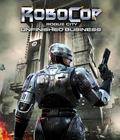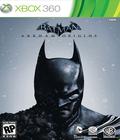One quick look at Batman: Arkham Origins would have one ready to dismiss it as simply "more Batman," with little or nothing to offer in the way of looking toward the future, spinning the franchise forward or any other cutely phrased concept that game enthusiasts like to throw out there.
That's partially right: It is more Batman. Origins has the same hero and most, if not all, of the same gameplay elements fans grew to enjoy from the Rocksteady-crafted installments regarding the Dark Knight. Instead of trying to outgun Arkham Asylum and Arkham City, WB Montreal's Origins offers up an experience of imperfect but ultimately satisfying sameness, wrapping itself in all the things that drew gamers into caring about Batman again in the first place. It doesn't make one wonder where the series is going, but rather affirms that it's in a very good place as the curtain falls on the current console era. It shows that "more Batman" is far from a terrible thing.
Arkham Origins was built as a prequel, which is far from an enviable task. Making a prequel — one that's any good, at least — seems to be one of the most difficult assignments in game design. Not only does the body of work have to mark its own creative territory, but it also has to do so without inadvertently wrecking the framework built on the backs of its forebears. Young Batman cannot be superior to the Batman we see in Asylum and City. Giving the younger Dark Knight some mind-blowing new gadget or never-before-seen system or fighting technique is a lose-lose situation. If it works, fans and players will wonder what the hell he did with it en route to finding trouble further along his timeline (Did he break it? Lose it? Get older, so he can't do that move anymore?). If it doesn't work, then you've just screwed up something that really wasn't broken in the first place.
Origins appears to acknowledge this from the outset, electing to focus on its own brand of storytelling and adding nuances to an established gameplay atmosphere.
The previous two games used elaborate setups to set the story's tone: Asylum featured a lengthy walk with the Joker en route to his containment area within Arkham, and Arkham City gives us the capture and imprisonment of Bruce Wayne as well as the deft use of Catwoman as our portal into the combat system. Origins doesn't do that. Instead, it plops Batman right into the middle of chasing criminals, another night in the life of his young career as a crime fighter. He hops into his Batwing, flies to a prison riot, and then starts doing Batman things, like beating down thugs with variants of striking with X and countering with Y.
The target this time is Black Mask, who was Gotham's alpha dog of the criminal underworld before everyone else started showing up. After a confrontation on the roof with a younger, not-as-huge and eminently beatable Killer Croc, Batman eventually learns that Black Mask has hired eight assassins to end him, which basically tells the player that he or she is about to engage in at least eight potentially memorable boss confrontations. This signaled an intriguing change from the previous games, which elected to roll out characters as the story progressed. Here, the message is simple: These people are coming. Be prepared. Among them are a younger Bane, supreme fighting machine Deathstroke, sniper extraordinaire Deadshot and a few newer faces, like a woman who acts like a snake and either poisons or crushes people to death with her body.
One of the key story elements of Origins is that Batman has donned the cowl for only a few years, which means he's still has a lot of work to do on his crime-fighting game. He's not missing roof jumps or flubbing grapple-hook grabs, but he is accidentally choking guys out while he interrogates them or reflecting on how poorly he has handled some situations. He likes to bash heads a bit more. Through some brilliant moments of dialogue and cinema screens, we see an unfinished Dark Knight who is prone to rash decisions and serious bouts of self-doubt, especially when some twists within the story occur — none of which I will spoil here. I also enjoyed the interplay between young Batman and younger versions of some of his future enemies. The Penguin is simply a well-stocked arms dealer, while the Riddler isn't even called the Riddler yet. He's simply known as Enigma. You see that Batman and a younger Jim Gordon really can't stand each other, with Gordon many times coming across as a stick-in-the-mud cop who only gets in Batman's way.
If you've played either of the previous two Arkham games, you'll be able to jump into combat and play with most of Batman's gadgets immediately. Striking and countering is the same (hit with X, counter with Y when you see the mini-thunderbolts above the head, cape stun with B), and you'll recognize a lot of Batman's tools, such as explosive gel, Batarangs, smoke pellets, Batclaw, etc. Among some of the new tools Batman eventually obtains are a "remote claw," which can be used to create zip line/rope points so Batman can access certain areas, and electric gloves than can not only power up certain devices but can also be charged in battle to turn the tide against more formidable foes.
Speaking of foes, the face-offs against the assassins were among the most powerful moments of the game for me, mainly because the approaches of each were so varied and echoed memorable fights I've witnessed in other titles. Trying to evade a juiced-up Bane in a claustrophobic web of corridors to stay out of his line of sight reminded of the fight between Snake and Vulcan Raven in MGS, where simply entering Raven's field of vision for too long would turn you into paste (the snarkist in me resisted the urge to yell "SNAAAKE!" whenever I unwittingly stumbled into Bane's path). The Deathstroke fight is a classic read-and-react, pattern recognition reflex test that looks like melee ballet between two martial arts masters. One thing I wasn't expecting was how the fight between Batman and one of the other assassins, the "Electrocutioner," played out. Think Indiana Jones versus Sword Guy.
One thing a little more complex than confrontation in Origins was a reinvigorated effort to showcase Batman's detective skills, or at least a subtly augmented and intricate evidence scanner. Batman has always been able to scan and analyze evidence and then follow a trail in the Arkham games, but Origins actually allows him to piece together a crime scene in full. After scanning as much evidence as he can, players are able to "play back" and "rewind" Batman's interpretation of what happened, with virtual figures depicting suspects and victims. Playback also allows players to find items and clues that the Gotham cops would otherwise compromise or miss, like a camera, key card or cell phone. In a brilliant move, one particular crime scene investigation is used as the appetizer for a stunning plot point that drives the whole experience up to another level. You probably know what it is by now, but for those of you who have managed to stay away from most clips or press about the game, I won't mention it here. I had an idea, and I still thought it was one of the game's finest moments.
Another hallmark of Origins is the sheer size of Gotham. This is before a section of the city was turned into Arkham City, so Batman actually has several districts to cover and fight crime. I enjoyed the ability to explore, but I also appreciated the option to use the Batwing to fast travel to certain parts of the city — provided you knock out one of Enigma's comm towers in that section first. Even covered under a blanket of winter, Gotham looks as majestically foreboding as you can expect, and some of the newer locations — such as Penguin's arms ship, the city's central bank and a towering hotel — are well crafted. In Arkham tradition, there are plenty of side missions and diversions from the main story, whether it's clearing out crimes in progress or trying to shut down Enigma/Riddler's information relays scattered around the city.
However, in the midst of solving crimes while exploring Gotham, it's impossible to ignore some annoying issues. Firstly, there are bugs. The game froze on me a handful of times, and each time seemed to adhere to Murphy's Law when it came to timing: right after a difficult boss fight when it was trying to switch to a cinema screen, right before a boss fight when I reached a certain area, right as I'm arriving at my waypoint on the map, sometimes when I summoned the Batwing. I've heard tales of a game-killing bug where players simply can't progress to face another one of the assassins. I didn't experience that one, but these are real issues that shouldn't be faced in games anymore. There was also some bugginess when accessing multiplayer, which is a shame because the concepts behind them are full of fun. I either couldn't find games, couldn't adjust the menus or just stayed frozen on my death screen. When I was able to play, I had the option of being a simple criminal with a gun trying to shoot everyone, or I could be a hero, diving into the fray as Batman or Robin and stealthily taking out humans while crawling through grates and operating in the shadows. Or, I could be a super-villain like Bane and smash everyone in my path. Again, the bugs prevented me from enjoying this consistently.
In terms of combat, while the system remains the same, the approach from enemies can be tiresome. The Origins thugs seem typically hardier than the ones in games past, and now they come in wave after wave, even in basic confrontations on the street. The game likes feeding thugs to Batman's fists as a way of upping the challenge, instead of taking a page from the previous games and adding environmental challenges to change things up (electrified floor from Asylum, for example).
Lastly, for all of Origins' merits as a prequel, the price it pays is that it doesn't seem quite as deep as its predecessors. Asylum featured the epic representation of the Scarecrow and all the mind-screwing he was capable of pulling off, while Arkham City featured Catwoman and that amazing sequence involving Ra's Al Ghul and the League of Assassins. However, the argument could be made that since this is Batman in his crime-fighting infancy, his world has yet to travel into the depths we enjoyed in the past few years. For the big Origins moment, he'll have to settle for meeting someone for which he wasn't prepared, and how he eventually opens the door to a greater brand of darkness. In its own way, that's something that spins the story forward.
Score: 7.5/10
More articles about Batman: Arkham Origins











 Batman: Arkham Origins features an expanded Gotham City and introduces an original prequel storyline set several years before the events of the first two games of the franchise.
Batman: Arkham Origins features an expanded Gotham City and introduces an original prequel storyline set several years before the events of the first two games of the franchise.










































